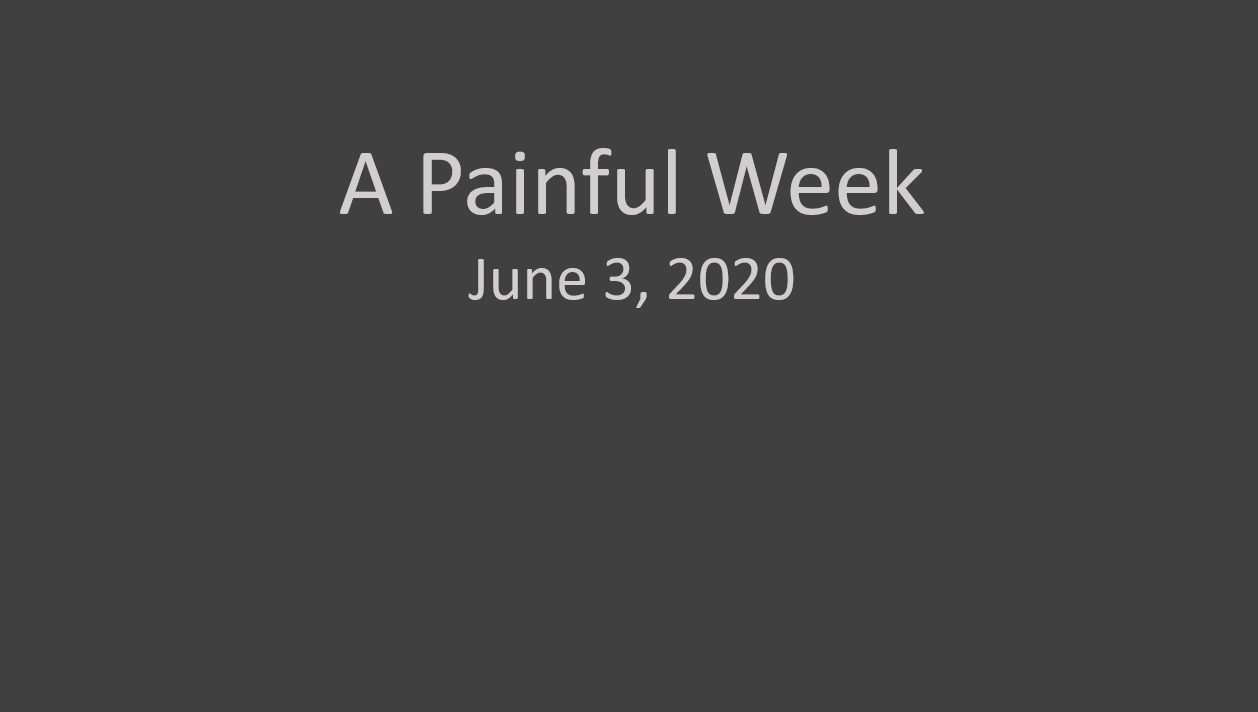
Reflections on a Painful Week
June 3, 2020/
Reflections on a Painful Week
The murder of George Floyd by a Minneapolis police officer spurred some self-reflection. As a white male, slightly past middle-age, I know I represent a power structure and societal context wired for my benefit and sustained by my peers. By a simple of gift of birth, I never had to deal with hurdles, hardships, or hindrances in being who I wanted to be. My deck contained all the right cards. I could remain aloof and isolated from systemic problems.
I was fortunate enough to be raised by parents who did not want me ignorant of the world around me. My father is a Presbyterian pastor. In the mid-60s, he helped compose a civil rights paper for Lexington Presbytery in Virginia, arguing for the support of racial equality, justice, and being with the movement led by fellow pastor, Martin Luther King, Jr. In 1968, he responded as a pastor to the riots occurring in nearby Washington, DC. In 1972, he and his African-American colleague, the Rev. Joe Spears, entered Statesville High School as mediators after racial violence exploded in the hallways, sitting with students, getting them to talk to one another and begin a process of healing. Joe’s son, Mark, and I were classmates who really thought nothing of sitting and drawing together for hours—just two kids and a box of crayons. At nine years old, we saw each other as just boys.
I remember in college, though, coming to another awareness. Sitting in a class on the American Civil War, I saw a chapter in my family history no one really mentioned. My family branch of Watkins came to this country having been more or less invited to leave Wales—prison or emigration? Two brothers wound up in the Midwest, while one brother went south—all of this movement in the early 19th Century. Sitting there in class, learning of the history of the South and her slave peoples, it dawned on me there were an awful lot of Watkins who were a different color from me. I began to realize there was a whole other layer to my family history. I had a whole bunch of siblings, cousins, in-laws, and outlaws who had come into the family by purchase. I could never tolerate Davidson College’s Old South weekend ever again. The hoop skirts and gray uniforms were more than I could bear. I think I lost a couple of friends when I voiced my disgust.
Still, as a white male, I never really had to deal with the the issues my fellow students of color ever did. Davidson was open to any student who met their standards, but how many of us already had a ten lap lead in the race to get in? When I was there, it was a white school. Folks of color adapted and adjusted. I never had to change anything about my immature, obnoxious self.
A few years later, I was talking with a dear friend from college who now lived in the same neighborhood as me. He is African-American, married to an Asian, and he remarked that his family was the diversification of our south Charlotte neighborhood. I laughed as he smiled, missing the darker rue in his voice.
A couple of decades later, I finally realized what he meant. In California, I moved into an apartment complex to wait for Alison and the dog to move to join me. The complex was a rainbow of humanity. Latino, Middle-Eastern, Asian, Pacific Islander, African, and African-American were the vast majority. I was the exception. I was the alternate. I was the token. It’s different when there aren’t other faces like yours.
Yet, I was still a white male. The police car that passed through the complex nightly just waved and smiled at me. Never paused or even slowed down.
How different from the young man who died waving his cellphone, shot by a police officer in Sacramento who assumed he had a gun.
So what can I do?
Stop.
Look.
Listen.
I need to stop talking. I need to stop assuming. I need to stop reacting. I need to just stop.
I need to look. Do I see myself for who I actually am? Do I see how I got where I am? Do I see my history, all of it? Do I see the person before me? Do I see them for who they actually are? Do I see how they got where they are? Do I see their history, all of it? Am I willing to see where their story and mine run headlong into each other? Am I willing to see the train wreck alongside the intersection?
I need to listen. I need to really listen to what the other is saying. I need to hear their story as their story, not questioning it, arguing with it, or denying it. I need to listen deeply. I need to listen long. It’s going to hurt, but I need to really hear it—my family is the diversification of this neighborhood—did I hear the anxiety? Did I hear the worry for children? Did I hear the voice of someone who is there but not quite sure of the welcome? I need to hear the full power of what is shared and said. I do not need to justify, rationalize, or harmonize. I just need to listen.
I am a white male.
It is time for me to simply stop, look, and listen. There has been enough doing, blindness, and talking from my side.
Posted in Mallard Creek News